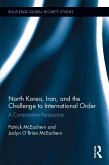Ofer Israeli
International Relations Theory of War (eBook, PDF)
26,95 €
26,95 €
inkl. MwSt.
Sofort per Download lieferbar

13 °P sammeln
26,95 €
Als Download kaufen

26,95 €
inkl. MwSt.
Sofort per Download lieferbar

13 °P sammeln
Jetzt verschenken
Alle Infos zum eBook verschenken
26,95 €
inkl. MwSt.
Sofort per Download lieferbar
Alle Infos zum eBook verschenken

13 °P sammeln
Ofer Israeli
International Relations Theory of War (eBook, PDF)
- Format: PDF
- Merkliste
- Auf die Merkliste
- Bewerten Bewerten
- Teilen
- Produkt teilen
- Produkterinnerung
- Produkterinnerung

Bitte loggen Sie sich zunächst in Ihr Kundenkonto ein oder registrieren Sie sich bei
bücher.de, um das eBook-Abo tolino select nutzen zu können.
Hier können Sie sich einloggen
Hier können Sie sich einloggen
Sie sind bereits eingeloggt. Klicken Sie auf 2. tolino select Abo, um fortzufahren.

Bitte loggen Sie sich zunächst in Ihr Kundenkonto ein oder registrieren Sie sich bei bücher.de, um das eBook-Abo tolino select nutzen zu können.
Covering 1816-2016, this book deals extensively with the international system as well as the territorial outcomes of several key wars that were waged during that time period, providing an instructive lesson in diplomatic history and international relations among global powers.
Based on an in-depth review of the leading theories in the field of international relations, International Relations Theory of War explains an innovative theory on the international system, developed by the author, that he applies comprehensively to a large number of case studies. The book argues that there is a…mehr
- Geräte: PC
- mit Kopierschutz
- eBook Hilfe
- Größe: 6.35MB
Andere Kunden interessierten sich auch für
![Reviewing the Responsibility to Protect (eBook, PDF) Reviewing the Responsibility to Protect (eBook, PDF)]() Ramesh ThakurReviewing the Responsibility to Protect (eBook, PDF)43,95 €
Ramesh ThakurReviewing the Responsibility to Protect (eBook, PDF)43,95 €![Transatlantic Relations and Modern Diplomacy (eBook, PDF) Transatlantic Relations and Modern Diplomacy (eBook, PDF)]() Transatlantic Relations and Modern Diplomacy (eBook, PDF)44,95 €
Transatlantic Relations and Modern Diplomacy (eBook, PDF)44,95 €![North Korea, Iran and the Challenge to International Order (eBook, PDF) North Korea, Iran and the Challenge to International Order (eBook, PDF)]() Patrick MceachernNorth Korea, Iran and the Challenge to International Order (eBook, PDF)41,95 €
Patrick MceachernNorth Korea, Iran and the Challenge to International Order (eBook, PDF)41,95 €![Kosovo's Foreign Policy and Bilateral Relations (eBook, PDF) Kosovo's Foreign Policy and Bilateral Relations (eBook, PDF)]() Kosovo's Foreign Policy and Bilateral Relations (eBook, PDF)42,95 €
Kosovo's Foreign Policy and Bilateral Relations (eBook, PDF)42,95 €![Navies and Foreign Policy (Routledge Revivals) (eBook, PDF) Navies and Foreign Policy (Routledge Revivals) (eBook, PDF)]() Ken BoothNavies and Foreign Policy (Routledge Revivals) (eBook, PDF)42,95 €
Ken BoothNavies and Foreign Policy (Routledge Revivals) (eBook, PDF)42,95 €![A Perpetual Menace (eBook, PDF) A Perpetual Menace (eBook, PDF)]() William WalkerA Perpetual Menace (eBook, PDF)46,95 €
William WalkerA Perpetual Menace (eBook, PDF)46,95 €![ASEAN and the Responsibility to Protect (eBook, PDF) ASEAN and the Responsibility to Protect (eBook, PDF)]() Thida Chanthima NethASEAN and the Responsibility to Protect (eBook, PDF)44,95 €
Thida Chanthima NethASEAN and the Responsibility to Protect (eBook, PDF)44,95 €-
-
-
Covering 1816-2016, this book deals extensively with the international system as well as the territorial outcomes of several key wars that were waged during that time period, providing an instructive lesson in diplomatic history and international relations among global powers.
Based on an in-depth review of the leading theories in the field of international relations, International Relations Theory of War explains an innovative theory on the international system, developed by the author, that he applies comprehensively to a large number of case studies. The book argues that there is a unipolar system that represents a kind of innovation relative to other systemic theories. It further posits that unipolar systems will be less stable than bipolar systems and more stable than multipolar systems, providing new insights relative to other theories that argue that unipolar systems are the most stable ones.
The first chapter is devoted to explaining the manner of action of the two dependent variables-systemic international outcome and intra-systemic international outcome. The second chapter presents the international relations theory of war and its key assumptions. The third chapter precisely defines the distribution of power in the system. The fourth chapter examines the theory's two key phenomena. The fifth and last chapter presents the book's conclusions by examining the theoretical assumptions of the international relations theory of war.
Based on an in-depth review of the leading theories in the field of international relations, International Relations Theory of War explains an innovative theory on the international system, developed by the author, that he applies comprehensively to a large number of case studies. The book argues that there is a unipolar system that represents a kind of innovation relative to other systemic theories. It further posits that unipolar systems will be less stable than bipolar systems and more stable than multipolar systems, providing new insights relative to other theories that argue that unipolar systems are the most stable ones.
The first chapter is devoted to explaining the manner of action of the two dependent variables-systemic international outcome and intra-systemic international outcome. The second chapter presents the international relations theory of war and its key assumptions. The third chapter precisely defines the distribution of power in the system. The fourth chapter examines the theory's two key phenomena. The fifth and last chapter presents the book's conclusions by examining the theoretical assumptions of the international relations theory of war.
Produktdetails
- Produktdetails
- Verlag: Bloomsbury Publishing Inc
- Seitenzahl: 248
- Altersempfehlung: ab 7 Jahre
- Erscheinungstermin: 10. April 2019
- Englisch
- ISBN-13: 9781440871351
- Artikelnr.: 68206139
- Verlag: Bloomsbury Publishing Inc
- Seitenzahl: 248
- Altersempfehlung: ab 7 Jahre
- Erscheinungstermin: 10. April 2019
- Englisch
- ISBN-13: 9781440871351
- Artikelnr.: 68206139
- Herstellerkennzeichnung Die Herstellerinformationen sind derzeit nicht verfügbar.
Ofer Israeli, PhD, is a lecturer and senior research fellow in the Institute for Policy and Strategy at the Interdisciplinary Center Herzliya and a research fellow at the National Security Studies Center, University of Haifa, Israel.
Preface Introduction: International Relations Theory of War The Systemic
International Outcomes-Stability of International Systems The Intrasystemic
International Outcomes-Territorial Expansion of Polar Powers International
Outcomes: Primary Disputes and Coping Why Do Wars Break Out? Structural
Theoretical Research The Structure of the Book 1. War-Theory and Analysis
of Results On Powers and Wars Systemic International Outcomes Systemic
Factors and International Systems Durability Systemic Factors and
International Systems Stability Intrasystemic International Outcomes
Systemic Factors and Expansion of Influence of Polar Powers Systemic
Factors and Expansion of Influence of Polar Powers at the Ends of Wars 2.
International Relations Theory of War Basic Assumptions of the Theory
Hypotheses of the Theory Concerning the Two International Outcomes
Stability of International Systems Degree of Territorial Expansion
Territorial Outcomes under Unipolar Systems Territorial Outcomes under
Bipolar Systems Territorial Outcomes under Multipolar Systems The
Transhistorical Principles Anarchy and the Tendency to Hegemonies Anarchy
in the Theoretical Research of International Relations The Way
Constructivism, Neoliberalism, and Realism Relate to Anarchy Status Quo,
Revisionism, and Aspiration for Power Homeostasis and Preservation of the
System Homeostasis in the International System Homeostasis in International
Systems: Historical Examples Homeostasis and Feedback Models The
International Relations Theory of War and Homeostasis Polarity of the
System: The Independent Variable The Most Important Player in the
International System: The State Great Power or Polar Power Polar Power in
the Current Study Between Sea Power and Land Power Possible Polarity Models
Polarity of the System and International Outcomes Summary of the Principle
of the Model The Systemic Status of the International Relations Theory of
War The International Relations Theory of War and Other Key Realist
Theories 3. Polarity of the System 4. How the Research Is Empirically
Examined Systemic Factors and Stability of International Systems Stability
of International Systems-Quantitative Research Systemic Factors and the
Stability of Multipolar Systems The Stability of the Multipolar System,
1849-1870 The Stability of the Multipolar System, 1910-1945 Systemic
Factors and the Stability of Bipolar Systems The Stability of the Bipolar
System, 1816-1848 The Stability of the Bipolar System, 1871-1909 The
Stability of the Bipolar System, 1946-1991 Systemic Factors and the
Stability of the Unipolar System The Stability of the Unipolar System,
1992-2016 The Stability of International Systems-Qualitative Assessment
Stability of International Systems in a Multipolar System Wars as an
Unintended Consequence or Systemic Dictate of the Players The Stability of
the Multipolar System, 1849-1870 Crimean War The Crimean War-Common
Explanations for Its Outbreak The Crimean War-Systemic Causes of Its
Outbreak The Crimean War-Its Consequences The Stability of the Multipolar
System, 1910-1945 The First World War Systemic Causes of the Outbreak of
the First World War The Second World War Systemic Analysis of the Outbreak
of the Second World War The Multipolar System, 1910-1945-Summary and
Consequences Stability of International Systems in Bipolar System The
Stability of the Bipolar System, 1816-1848, 1871-1909 The Stability of the
Bipolar System, 1946-1991 The Long Peace in the Cold War Period and Its
Causes Stability of International Systems in Unipolar System The Stability
of the Unipolar System, 1992-2016 The Unipolar System and American
Involvement Persian Gulf Region East Asia Region Military Involvements of
the United States The Stability of International Systems-Conclusions
Systemic Factors and Territorial Outcomes of Wars Territorial Outcomes of
Wars of Polar Powers-Quantitative Assessment Territorial Outcomes in
Multipolar Systems Territorial Outcomes in the Multipolar System, 1849-1870
Territorial Outcomes in the Multipolar System, 1910-1945 Territorial
Outcomes in Bipolar Systems Territorial Outcomes in the Bipolar System,
1816-1848 Territorial Outcomes in the Bipolar System, 1871-1909 Territorial
Outcomes in the Bipolar System, 1946-1991 Territorial Outcomes in Unipolar
Systems Territorial Outcomes in the Unipolar System, 1992-2016 Territorial
Outcomes of Wars of Polar Powers-Qualitative Assessment Territorial
Outcomes in Multipolar Systems The Multipolar System, 1849-1870 The Crimean
War (1853-1856) The Seven Weeks' War between Prussia and Austria (1866) The
Franco-Prussian War (1870-1871) The Multipolar System, 1910-1945 The First
World War (1914-1918) The Second World War (1939-1945) Territorial Outcomes
in Bipolar Systems The Bipolar System, 1946-1991 The U.S.-Korea War
(1950-1953) The U.S.-Vietnam War (1968-1975) The Gulf War (1991)
Territorial Outcomes in Unipolar Systems Territorial Outcomes at the End of
the Polar Powers' Wars against Afghanistan "The Great Game" in Central Asia
and the Importance of Afghanistan The First Anglo-Afghan War (1838-1842)
Why Did Britain Invade Afghanistan? The Invasion The Systemic Pressures for
the British Pullout from Afghanistan The British Withdrawal from
Afghanistan The First Anglo-Afghan War and Its Consequences The Second
Anglo-Afghan War (1878-1880) Why Did Britain Invade Afghanistan? The
Invasion The Systemic Pressures for the British Pullout from Afghanistan
Summary of the First (1838-1842) and Second (1878-1880) Anglo-Afghan Wars
The Third Anglo-Afghan War (1919) Why Did Britain Invade Afghanistan? The
Invasion The Systemic Pressures for the British Pullout from Afghanistan
The Soviet-Afghan War (1979-1988) Why Did the Soviet Union Invade
Afghanistan? The Systemic Constraints That Were Employed in the War The
U.S.-Afghan War (2001) Why Did the United States Invade Afghanistan? The
Invasion The Systemic Pressures for the United States' Departure from
Afghanistan The Prolonged American Presence in Afghanistan The Consequences
of the U.S.-Afghan War Summary of the Five Wars of Polar Powers against
Afghanistan Territorial Outcomes of the Wars of Polar Powers-Interim
Summary 5. The Distribution of Power and International Outcomes:
Conclusions International Outcomes: Analysis and Evaluation Index of
Stability of International Systems Estimation of Territorial Outcomes of
Wars of Polar Powers A New World Order? Appendix A: The Greatest Powers
According to the Cow Project Appendix B: Interstate War, 1816-2007,
According to the Cow Project Notes References Index
International Outcomes-Stability of International Systems The Intrasystemic
International Outcomes-Territorial Expansion of Polar Powers International
Outcomes: Primary Disputes and Coping Why Do Wars Break Out? Structural
Theoretical Research The Structure of the Book 1. War-Theory and Analysis
of Results On Powers and Wars Systemic International Outcomes Systemic
Factors and International Systems Durability Systemic Factors and
International Systems Stability Intrasystemic International Outcomes
Systemic Factors and Expansion of Influence of Polar Powers Systemic
Factors and Expansion of Influence of Polar Powers at the Ends of Wars 2.
International Relations Theory of War Basic Assumptions of the Theory
Hypotheses of the Theory Concerning the Two International Outcomes
Stability of International Systems Degree of Territorial Expansion
Territorial Outcomes under Unipolar Systems Territorial Outcomes under
Bipolar Systems Territorial Outcomes under Multipolar Systems The
Transhistorical Principles Anarchy and the Tendency to Hegemonies Anarchy
in the Theoretical Research of International Relations The Way
Constructivism, Neoliberalism, and Realism Relate to Anarchy Status Quo,
Revisionism, and Aspiration for Power Homeostasis and Preservation of the
System Homeostasis in the International System Homeostasis in International
Systems: Historical Examples Homeostasis and Feedback Models The
International Relations Theory of War and Homeostasis Polarity of the
System: The Independent Variable The Most Important Player in the
International System: The State Great Power or Polar Power Polar Power in
the Current Study Between Sea Power and Land Power Possible Polarity Models
Polarity of the System and International Outcomes Summary of the Principle
of the Model The Systemic Status of the International Relations Theory of
War The International Relations Theory of War and Other Key Realist
Theories 3. Polarity of the System 4. How the Research Is Empirically
Examined Systemic Factors and Stability of International Systems Stability
of International Systems-Quantitative Research Systemic Factors and the
Stability of Multipolar Systems The Stability of the Multipolar System,
1849-1870 The Stability of the Multipolar System, 1910-1945 Systemic
Factors and the Stability of Bipolar Systems The Stability of the Bipolar
System, 1816-1848 The Stability of the Bipolar System, 1871-1909 The
Stability of the Bipolar System, 1946-1991 Systemic Factors and the
Stability of the Unipolar System The Stability of the Unipolar System,
1992-2016 The Stability of International Systems-Qualitative Assessment
Stability of International Systems in a Multipolar System Wars as an
Unintended Consequence or Systemic Dictate of the Players The Stability of
the Multipolar System, 1849-1870 Crimean War The Crimean War-Common
Explanations for Its Outbreak The Crimean War-Systemic Causes of Its
Outbreak The Crimean War-Its Consequences The Stability of the Multipolar
System, 1910-1945 The First World War Systemic Causes of the Outbreak of
the First World War The Second World War Systemic Analysis of the Outbreak
of the Second World War The Multipolar System, 1910-1945-Summary and
Consequences Stability of International Systems in Bipolar System The
Stability of the Bipolar System, 1816-1848, 1871-1909 The Stability of the
Bipolar System, 1946-1991 The Long Peace in the Cold War Period and Its
Causes Stability of International Systems in Unipolar System The Stability
of the Unipolar System, 1992-2016 The Unipolar System and American
Involvement Persian Gulf Region East Asia Region Military Involvements of
the United States The Stability of International Systems-Conclusions
Systemic Factors and Territorial Outcomes of Wars Territorial Outcomes of
Wars of Polar Powers-Quantitative Assessment Territorial Outcomes in
Multipolar Systems Territorial Outcomes in the Multipolar System, 1849-1870
Territorial Outcomes in the Multipolar System, 1910-1945 Territorial
Outcomes in Bipolar Systems Territorial Outcomes in the Bipolar System,
1816-1848 Territorial Outcomes in the Bipolar System, 1871-1909 Territorial
Outcomes in the Bipolar System, 1946-1991 Territorial Outcomes in Unipolar
Systems Territorial Outcomes in the Unipolar System, 1992-2016 Territorial
Outcomes of Wars of Polar Powers-Qualitative Assessment Territorial
Outcomes in Multipolar Systems The Multipolar System, 1849-1870 The Crimean
War (1853-1856) The Seven Weeks' War between Prussia and Austria (1866) The
Franco-Prussian War (1870-1871) The Multipolar System, 1910-1945 The First
World War (1914-1918) The Second World War (1939-1945) Territorial Outcomes
in Bipolar Systems The Bipolar System, 1946-1991 The U.S.-Korea War
(1950-1953) The U.S.-Vietnam War (1968-1975) The Gulf War (1991)
Territorial Outcomes in Unipolar Systems Territorial Outcomes at the End of
the Polar Powers' Wars against Afghanistan "The Great Game" in Central Asia
and the Importance of Afghanistan The First Anglo-Afghan War (1838-1842)
Why Did Britain Invade Afghanistan? The Invasion The Systemic Pressures for
the British Pullout from Afghanistan The British Withdrawal from
Afghanistan The First Anglo-Afghan War and Its Consequences The Second
Anglo-Afghan War (1878-1880) Why Did Britain Invade Afghanistan? The
Invasion The Systemic Pressures for the British Pullout from Afghanistan
Summary of the First (1838-1842) and Second (1878-1880) Anglo-Afghan Wars
The Third Anglo-Afghan War (1919) Why Did Britain Invade Afghanistan? The
Invasion The Systemic Pressures for the British Pullout from Afghanistan
The Soviet-Afghan War (1979-1988) Why Did the Soviet Union Invade
Afghanistan? The Systemic Constraints That Were Employed in the War The
U.S.-Afghan War (2001) Why Did the United States Invade Afghanistan? The
Invasion The Systemic Pressures for the United States' Departure from
Afghanistan The Prolonged American Presence in Afghanistan The Consequences
of the U.S.-Afghan War Summary of the Five Wars of Polar Powers against
Afghanistan Territorial Outcomes of the Wars of Polar Powers-Interim
Summary 5. The Distribution of Power and International Outcomes:
Conclusions International Outcomes: Analysis and Evaluation Index of
Stability of International Systems Estimation of Territorial Outcomes of
Wars of Polar Powers A New World Order? Appendix A: The Greatest Powers
According to the Cow Project Appendix B: Interstate War, 1816-2007,
According to the Cow Project Notes References Index
Preface Introduction: International Relations Theory of War The Systemic
International Outcomes-Stability of International Systems The Intrasystemic
International Outcomes-Territorial Expansion of Polar Powers International
Outcomes: Primary Disputes and Coping Why Do Wars Break Out? Structural
Theoretical Research The Structure of the Book 1. War-Theory and Analysis
of Results On Powers and Wars Systemic International Outcomes Systemic
Factors and International Systems Durability Systemic Factors and
International Systems Stability Intrasystemic International Outcomes
Systemic Factors and Expansion of Influence of Polar Powers Systemic
Factors and Expansion of Influence of Polar Powers at the Ends of Wars 2.
International Relations Theory of War Basic Assumptions of the Theory
Hypotheses of the Theory Concerning the Two International Outcomes
Stability of International Systems Degree of Territorial Expansion
Territorial Outcomes under Unipolar Systems Territorial Outcomes under
Bipolar Systems Territorial Outcomes under Multipolar Systems The
Transhistorical Principles Anarchy and the Tendency to Hegemonies Anarchy
in the Theoretical Research of International Relations The Way
Constructivism, Neoliberalism, and Realism Relate to Anarchy Status Quo,
Revisionism, and Aspiration for Power Homeostasis and Preservation of the
System Homeostasis in the International System Homeostasis in International
Systems: Historical Examples Homeostasis and Feedback Models The
International Relations Theory of War and Homeostasis Polarity of the
System: The Independent Variable The Most Important Player in the
International System: The State Great Power or Polar Power Polar Power in
the Current Study Between Sea Power and Land Power Possible Polarity Models
Polarity of the System and International Outcomes Summary of the Principle
of the Model The Systemic Status of the International Relations Theory of
War The International Relations Theory of War and Other Key Realist
Theories 3. Polarity of the System 4. How the Research Is Empirically
Examined Systemic Factors and Stability of International Systems Stability
of International Systems-Quantitative Research Systemic Factors and the
Stability of Multipolar Systems The Stability of the Multipolar System,
1849-1870 The Stability of the Multipolar System, 1910-1945 Systemic
Factors and the Stability of Bipolar Systems The Stability of the Bipolar
System, 1816-1848 The Stability of the Bipolar System, 1871-1909 The
Stability of the Bipolar System, 1946-1991 Systemic Factors and the
Stability of the Unipolar System The Stability of the Unipolar System,
1992-2016 The Stability of International Systems-Qualitative Assessment
Stability of International Systems in a Multipolar System Wars as an
Unintended Consequence or Systemic Dictate of the Players The Stability of
the Multipolar System, 1849-1870 Crimean War The Crimean War-Common
Explanations for Its Outbreak The Crimean War-Systemic Causes of Its
Outbreak The Crimean War-Its Consequences The Stability of the Multipolar
System, 1910-1945 The First World War Systemic Causes of the Outbreak of
the First World War The Second World War Systemic Analysis of the Outbreak
of the Second World War The Multipolar System, 1910-1945-Summary and
Consequences Stability of International Systems in Bipolar System The
Stability of the Bipolar System, 1816-1848, 1871-1909 The Stability of the
Bipolar System, 1946-1991 The Long Peace in the Cold War Period and Its
Causes Stability of International Systems in Unipolar System The Stability
of the Unipolar System, 1992-2016 The Unipolar System and American
Involvement Persian Gulf Region East Asia Region Military Involvements of
the United States The Stability of International Systems-Conclusions
Systemic Factors and Territorial Outcomes of Wars Territorial Outcomes of
Wars of Polar Powers-Quantitative Assessment Territorial Outcomes in
Multipolar Systems Territorial Outcomes in the Multipolar System, 1849-1870
Territorial Outcomes in the Multipolar System, 1910-1945 Territorial
Outcomes in Bipolar Systems Territorial Outcomes in the Bipolar System,
1816-1848 Territorial Outcomes in the Bipolar System, 1871-1909 Territorial
Outcomes in the Bipolar System, 1946-1991 Territorial Outcomes in Unipolar
Systems Territorial Outcomes in the Unipolar System, 1992-2016 Territorial
Outcomes of Wars of Polar Powers-Qualitative Assessment Territorial
Outcomes in Multipolar Systems The Multipolar System, 1849-1870 The Crimean
War (1853-1856) The Seven Weeks' War between Prussia and Austria (1866) The
Franco-Prussian War (1870-1871) The Multipolar System, 1910-1945 The First
World War (1914-1918) The Second World War (1939-1945) Territorial Outcomes
in Bipolar Systems The Bipolar System, 1946-1991 The U.S.-Korea War
(1950-1953) The U.S.-Vietnam War (1968-1975) The Gulf War (1991)
Territorial Outcomes in Unipolar Systems Territorial Outcomes at the End of
the Polar Powers' Wars against Afghanistan "The Great Game" in Central Asia
and the Importance of Afghanistan The First Anglo-Afghan War (1838-1842)
Why Did Britain Invade Afghanistan? The Invasion The Systemic Pressures for
the British Pullout from Afghanistan The British Withdrawal from
Afghanistan The First Anglo-Afghan War and Its Consequences The Second
Anglo-Afghan War (1878-1880) Why Did Britain Invade Afghanistan? The
Invasion The Systemic Pressures for the British Pullout from Afghanistan
Summary of the First (1838-1842) and Second (1878-1880) Anglo-Afghan Wars
The Third Anglo-Afghan War (1919) Why Did Britain Invade Afghanistan? The
Invasion The Systemic Pressures for the British Pullout from Afghanistan
The Soviet-Afghan War (1979-1988) Why Did the Soviet Union Invade
Afghanistan? The Systemic Constraints That Were Employed in the War The
U.S.-Afghan War (2001) Why Did the United States Invade Afghanistan? The
Invasion The Systemic Pressures for the United States' Departure from
Afghanistan The Prolonged American Presence in Afghanistan The Consequences
of the U.S.-Afghan War Summary of the Five Wars of Polar Powers against
Afghanistan Territorial Outcomes of the Wars of Polar Powers-Interim
Summary 5. The Distribution of Power and International Outcomes:
Conclusions International Outcomes: Analysis and Evaluation Index of
Stability of International Systems Estimation of Territorial Outcomes of
Wars of Polar Powers A New World Order? Appendix A: The Greatest Powers
According to the Cow Project Appendix B: Interstate War, 1816-2007,
According to the Cow Project Notes References Index
International Outcomes-Stability of International Systems The Intrasystemic
International Outcomes-Territorial Expansion of Polar Powers International
Outcomes: Primary Disputes and Coping Why Do Wars Break Out? Structural
Theoretical Research The Structure of the Book 1. War-Theory and Analysis
of Results On Powers and Wars Systemic International Outcomes Systemic
Factors and International Systems Durability Systemic Factors and
International Systems Stability Intrasystemic International Outcomes
Systemic Factors and Expansion of Influence of Polar Powers Systemic
Factors and Expansion of Influence of Polar Powers at the Ends of Wars 2.
International Relations Theory of War Basic Assumptions of the Theory
Hypotheses of the Theory Concerning the Two International Outcomes
Stability of International Systems Degree of Territorial Expansion
Territorial Outcomes under Unipolar Systems Territorial Outcomes under
Bipolar Systems Territorial Outcomes under Multipolar Systems The
Transhistorical Principles Anarchy and the Tendency to Hegemonies Anarchy
in the Theoretical Research of International Relations The Way
Constructivism, Neoliberalism, and Realism Relate to Anarchy Status Quo,
Revisionism, and Aspiration for Power Homeostasis and Preservation of the
System Homeostasis in the International System Homeostasis in International
Systems: Historical Examples Homeostasis and Feedback Models The
International Relations Theory of War and Homeostasis Polarity of the
System: The Independent Variable The Most Important Player in the
International System: The State Great Power or Polar Power Polar Power in
the Current Study Between Sea Power and Land Power Possible Polarity Models
Polarity of the System and International Outcomes Summary of the Principle
of the Model The Systemic Status of the International Relations Theory of
War The International Relations Theory of War and Other Key Realist
Theories 3. Polarity of the System 4. How the Research Is Empirically
Examined Systemic Factors and Stability of International Systems Stability
of International Systems-Quantitative Research Systemic Factors and the
Stability of Multipolar Systems The Stability of the Multipolar System,
1849-1870 The Stability of the Multipolar System, 1910-1945 Systemic
Factors and the Stability of Bipolar Systems The Stability of the Bipolar
System, 1816-1848 The Stability of the Bipolar System, 1871-1909 The
Stability of the Bipolar System, 1946-1991 Systemic Factors and the
Stability of the Unipolar System The Stability of the Unipolar System,
1992-2016 The Stability of International Systems-Qualitative Assessment
Stability of International Systems in a Multipolar System Wars as an
Unintended Consequence or Systemic Dictate of the Players The Stability of
the Multipolar System, 1849-1870 Crimean War The Crimean War-Common
Explanations for Its Outbreak The Crimean War-Systemic Causes of Its
Outbreak The Crimean War-Its Consequences The Stability of the Multipolar
System, 1910-1945 The First World War Systemic Causes of the Outbreak of
the First World War The Second World War Systemic Analysis of the Outbreak
of the Second World War The Multipolar System, 1910-1945-Summary and
Consequences Stability of International Systems in Bipolar System The
Stability of the Bipolar System, 1816-1848, 1871-1909 The Stability of the
Bipolar System, 1946-1991 The Long Peace in the Cold War Period and Its
Causes Stability of International Systems in Unipolar System The Stability
of the Unipolar System, 1992-2016 The Unipolar System and American
Involvement Persian Gulf Region East Asia Region Military Involvements of
the United States The Stability of International Systems-Conclusions
Systemic Factors and Territorial Outcomes of Wars Territorial Outcomes of
Wars of Polar Powers-Quantitative Assessment Territorial Outcomes in
Multipolar Systems Territorial Outcomes in the Multipolar System, 1849-1870
Territorial Outcomes in the Multipolar System, 1910-1945 Territorial
Outcomes in Bipolar Systems Territorial Outcomes in the Bipolar System,
1816-1848 Territorial Outcomes in the Bipolar System, 1871-1909 Territorial
Outcomes in the Bipolar System, 1946-1991 Territorial Outcomes in Unipolar
Systems Territorial Outcomes in the Unipolar System, 1992-2016 Territorial
Outcomes of Wars of Polar Powers-Qualitative Assessment Territorial
Outcomes in Multipolar Systems The Multipolar System, 1849-1870 The Crimean
War (1853-1856) The Seven Weeks' War between Prussia and Austria (1866) The
Franco-Prussian War (1870-1871) The Multipolar System, 1910-1945 The First
World War (1914-1918) The Second World War (1939-1945) Territorial Outcomes
in Bipolar Systems The Bipolar System, 1946-1991 The U.S.-Korea War
(1950-1953) The U.S.-Vietnam War (1968-1975) The Gulf War (1991)
Territorial Outcomes in Unipolar Systems Territorial Outcomes at the End of
the Polar Powers' Wars against Afghanistan "The Great Game" in Central Asia
and the Importance of Afghanistan The First Anglo-Afghan War (1838-1842)
Why Did Britain Invade Afghanistan? The Invasion The Systemic Pressures for
the British Pullout from Afghanistan The British Withdrawal from
Afghanistan The First Anglo-Afghan War and Its Consequences The Second
Anglo-Afghan War (1878-1880) Why Did Britain Invade Afghanistan? The
Invasion The Systemic Pressures for the British Pullout from Afghanistan
Summary of the First (1838-1842) and Second (1878-1880) Anglo-Afghan Wars
The Third Anglo-Afghan War (1919) Why Did Britain Invade Afghanistan? The
Invasion The Systemic Pressures for the British Pullout from Afghanistan
The Soviet-Afghan War (1979-1988) Why Did the Soviet Union Invade
Afghanistan? The Systemic Constraints That Were Employed in the War The
U.S.-Afghan War (2001) Why Did the United States Invade Afghanistan? The
Invasion The Systemic Pressures for the United States' Departure from
Afghanistan The Prolonged American Presence in Afghanistan The Consequences
of the U.S.-Afghan War Summary of the Five Wars of Polar Powers against
Afghanistan Territorial Outcomes of the Wars of Polar Powers-Interim
Summary 5. The Distribution of Power and International Outcomes:
Conclusions International Outcomes: Analysis and Evaluation Index of
Stability of International Systems Estimation of Territorial Outcomes of
Wars of Polar Powers A New World Order? Appendix A: The Greatest Powers
According to the Cow Project Appendix B: Interstate War, 1816-2007,
According to the Cow Project Notes References Index







